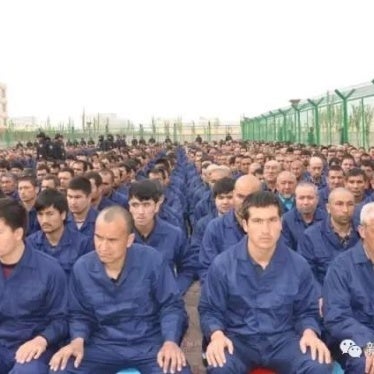As the UN Human Rights Council resumes its work this week, states should reject China’s attempt to rewrite the international human rights framework through a draft resolution disingenuously titled “mutually beneficial cooperation.”
The proposed resolution, China’s second on the subject, seeks to reposition international human rights law as a matter of State-to-State relations, ignores the responsibility of States to protect the rights of the individual, treats fundamental human rights as subject to negotiation and compromise, and foresees no meaningful role for civil society.
China’s first resolution, presented in March 2018, requested a report from the Council’s Advisory Committee. Many delegations expressed concern, but gave the resolution the benefit of the doubt, abstaining so they could wait to see what the Advisory Committee produced.
China’s intentions soon became crystal clear: its submission to the Advisory Committee hailed its own resolution as heralding “the construction of a new type of international relations.” The submission claims that human rights are used to “interfere” in the internal affairs of others, thus “poisoning the global atmosphere of human rights governance.”
This is hardly a coincidence: China has routinely opposed efforts at the Council to hold states responsible for even the gravest rights violations. When the OIC and EU jointly presented a resolution to address Myanmar’s international crimes against Rohingya Muslims, China called a vote and was one of only two countries to vote against.
The Advisory Committee report, published just before the Council session, only reinforces these concerns: it acknowledges that “serious conflicts of views exist with regard to the concept of ‘mutually beneficial cooperation,’” but offers no clear definition, identifies no value-added that the term brings over more established concepts such as technical cooperation and capacity-building – already part of the Council’s agenda – and even calls into question the universality of rights, referring to “so-called ‘universal’ values.”
Moreover, “mutually beneficial cooperation” assumes an equality of bargaining power among states that rarely exists. Time and again, China has demonstrated that it only sees cooperation as “beneficial” if it serves its own interests, threatening those who fail to bend to its will. During its UPR review last year, China issued a note verbal, warning delegations “in the interest of our bilateral relations” not to attend a state-led panel on grave violations in Xinjiang. Countries accepting Belt and Road Initiatives have discovered that they often come with hidden political costs. China’s UN ambassador has warned that seeking conditions to enable the High Commissioner for Human Rights to have independent access to Xinjiang is not in “the best interests of the United Nations.”
These concerns have become particularly acute in recent months. The global response to the Covid-19 pandemic has been hampered by China’s silencing of doctors who warned about the virus, censorship of online discussions, and arbitrary detention of people who criticized the government’s handling of the outbreak – at the expense of lives and livelihoods the world over. The EU has documented misinformation campaigns China has waged against other States in the context of the pandemic. When Australia sought an inquiry into the origins of the coronavirus and its handling, Beijing imposed trade sanctions. A pattern emerges, making clear what lies ahead if this resolution is adopted.
No resolution on cooperation should be so divisive. China should not proceed with this resolution without consensus. If it seeks to push the resolution to a contested vote, regardless of the concerns of other states, then that speaks volumes about its approach to “mutually beneficial” cooperation.
The flaws in the resolution reflect a fundamental ideological divide that cannot be addressed through edits, amendments, or window-dressing. States should resist this blatant attempt to undermine the international human rights framework, and vote against.








